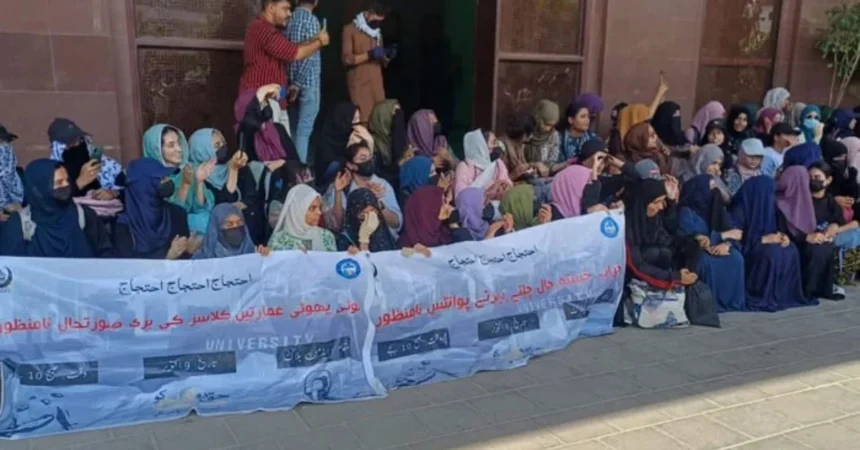In a significant development, the students of Karachi University (KU) have called off their protest after a successful negotiation with the university’s Vice Chancellor, Dr. Khalid Mahmood Iraqui. This protest lasted for eight days and was primarily focused on issues related to fee hikes and inadequate facilities on campus. The students had formed a collective under the ‘Student Organisations’ Alliance and raised several demands that were discussed during negotiations with the university administration.
Background of the Protest
The protest began as a reaction to a series of financial decisions made by the university, which students felt placed an undue burden on them. A 50% increase in late fees and a staggering 120% hike in examination fees were among the key points of contention. Additionally, students expressed concerns over poor transportation services and the dilapidated condition of university facilities, which they argued compromised their educational experience.
The protest at Karachi University emerged from a growing frustration among students regarding financial decisions that were seen as punitive. The substantial fee hikes were perceived as a direct attack on students’ financial stability, particularly for those from lower-income backgrounds. Many students voiced that such increases could force them to reconsider their education or even drop out altogether, thereby jeopardizing their future prospects.
In addition to the financial implications, students raised concerns about the deteriorating condition of campus facilities. Classrooms, libraries, and laboratories were reported to be inadequately maintained, impacting the quality of education they received. Students argued that a conducive learning environment is fundamental to their academic success and that neglecting infrastructure undermines their efforts.
Transportation issues further exacerbated the situation, with many students struggling to commute to campus due to unreliable services. The lack of efficient transportation options not only added to their financial burdens but also caused delays, affecting their attendance and overall academic performance. Students felt that addressing these issues was crucial for ensuring they could focus on their studies without unnecessary distractions.
The culmination of these frustrations led to a series of organized protests, which aimed to bring attention to the myriad of challenges students face daily. The demonstration became a platform for students to express their grievances and demand accountability from the university administration. Their collective voice sought not only immediate relief from the financial strains but also long-term changes that would enhance the overall student experience at Karachi University.
As the protest gained traction, it highlighted the need for universities to prioritize student welfare and actively engage with their concerns. By fostering open channels of communication and addressing students’ needs, educational institutions can create a more supportive environment that encourages academic excellence and personal growth. The events at Karachi University serve as a poignant reminder of the vital role that student activism plays in shaping the future of higher education.
Key Demands of the Students
The students presented a comprehensive list of demands to the administration, seeking fair treatment and improved conditions. Some of the primary demands included:
- Reversal of 50% Late Fees: Students demanded the reversal of the substantial late fee increase.
- Withdrawal of Examination Fee Hike: The recent 120% hike in examination fees was deemed excessive and called for immediate withdrawal.
- Abolition of Re-admission Fees: The Rs5,000 re-admission fee was viewed as an unnecessary financial burden.
- Opposition to Business Model Implementation: Students expressed concerns over the potential implementation of a business model at KU, fearing it could prioritize profit over education.
- Revocation of Notification on Fee Payment: A notification stating that students unable to pay fees would not be allowed to sit for exams was met with strong resistance.
- Discontinuation of “Not Eligible” Fees: The Rs1,500 charge under the “not eligible” category was seen as unfair and should be discontinued.
- Roll Back of Degree Fees Increase: A 200% increase in degree fees was considered unreasonable and needed to be addressed.
- Improvement of Campus Transportation: The students demanded that the university address the poor condition of buses used for student transportation.
- Enhanced Campus Security: Safety concerns were raised regarding campus security, prompting calls for improvements.
Negotiations and Outcomes
During the negotiations, Vice Chancellor Dr. Khalid Mahmood Iraqui agreed to accept 11 of the 14 demands proposed by the students. However, there was a discrepancy in the claims made by both parties regarding the number of accepted demands. While the Student Alliance asserted that a majority of their requests were honored, the university administration claimed that only two of the demands had been fully met.
- Reduced Late Fee: The late fee increase was reduced from 50% to a more manageable 10%.
- Re-admission Fee Policy: The re-admission fee would now only apply after four semesters, easing the financial pressure on students.
- Examination Fees: The examination fee will now be charged per course, making it more manageable for students.
- Increment in Semester Fees: There will be a 10% increase in semester fees, which was a point of contention during discussions.
The authority to determine eligibility for fees at KU has also been delegated to the chairpersons of various departments, allowing for more localized decision-making.
Impact of the Protest
The successful negotiation and the subsequent calling off of the protest highlight the power of collective action among students. It serves as a reminder of the importance of dialogue between educational institutions and their stakeholders. The protest not only brought attention to the financial burdens faced by students but also highlighted the critical need for universities to maintain infrastructure and provide adequate facilities.
The successful resolution of the Karachi University protest underscores the significance of student activism in shaping educational policies. When students unite for a common cause, they can effectively voice their concerns and influence decision-making at the administrative level. This collective effort not only empowers the student body but also emphasizes their role as active participants in the governance of their institutions.
Moreover, the outcome of this protest may encourage other student organizations across Pakistan to advocate for their rights. It serves as a precedent that highlights the potential impact of organized protests in bringing about tangible changes within educational institutions. This could lead to a wave of activism, where students feel more inclined to address issues such as tuition hikes, inadequate facilities, and the quality of education.
The administration’s willingness to negotiate and address student concerns reflects a positive shift towards more collaborative governance in universities. Such dialogues foster an environment where students and administration can work together to create policies that benefit all stakeholders. Regular engagement between student representatives and university officials can help build trust and transparency, ultimately enhancing the educational experience.
Additionally, the protest has drawn attention to the broader issue of funding and resource allocation in higher education. As universities face increasing financial pressures, the need for sustainable funding models becomes critical. Addressing these concerns through strategic planning and investment can help alleviate the financial burdens placed on students while ensuring the institution’s longevity.
Finally, the protest’s impact extends beyond immediate policy changes; it highlights the importance of student well-being and the need for universities to prioritize mental health and support services. As students navigate the pressures of academic life, access to adequate resources and support systems becomes vital in fostering a healthy and productive learning environment. The lessons learned from this protest can serve as a foundation for ongoing discussions about student welfare and institutional responsibility.
Future Considerations
While the immediate concerns of the protesting students have been addressed, several issues remain on the table. The administration must ensure that the agreements made are implemented effectively and transparently. Continuous engagement with student organizations is crucial in fostering a collaborative environment that can address future grievances.
- Monitoring of Fee Policies: There should be a system in place to regularly review fee structures to ensure they remain fair and equitable.
- Infrastructure Development: Ongoing investment in campus infrastructure and facilities is essential to provide a conducive learning environment for students.
- Student Representation: Establishing formal channels for student representation in decision-making processes can lead to better outcomes for the university community.
The resolution of the protests at Karachi University represents a significant moment for students’ rights and advocacy within educational institutions in Pakistan. As the university administration moves forward with the implementation of the agreed-upon demands, it is vital to maintain an open dialogue with students. Continued engagement will not only improve student satisfaction but also enhance the overall educational experience at the university.
#KarachiUniversity #StudentProtests #HigherEducation #Pakistan #StudentRights #FeeHike #CampusFacilities #EducationReform







